Unit 4 I used to be afraid of the dark.Section A 2a-2d 课件(共21张PPT,含内嵌音频) 人教版英语九年级全册
文档属性
| 名称 | Unit 4 I used to be afraid of the dark.Section A 2a-2d 课件(共21张PPT,含内嵌音频) 人教版英语九年级全册 | 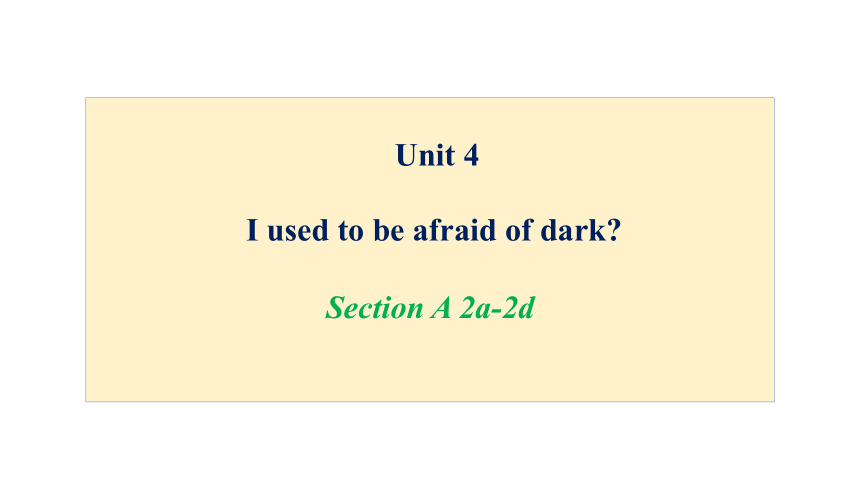 | |
| 格式 | pptx | ||
| 文件大小 | 4.8MB | ||
| 资源类型 | 教案 | ||
| 版本资源 | 人教新目标(Go for it)版 | ||
| 科目 | 英语 | ||
| 更新时间 | 2024-09-16 17:28:23 | ||
图片预览

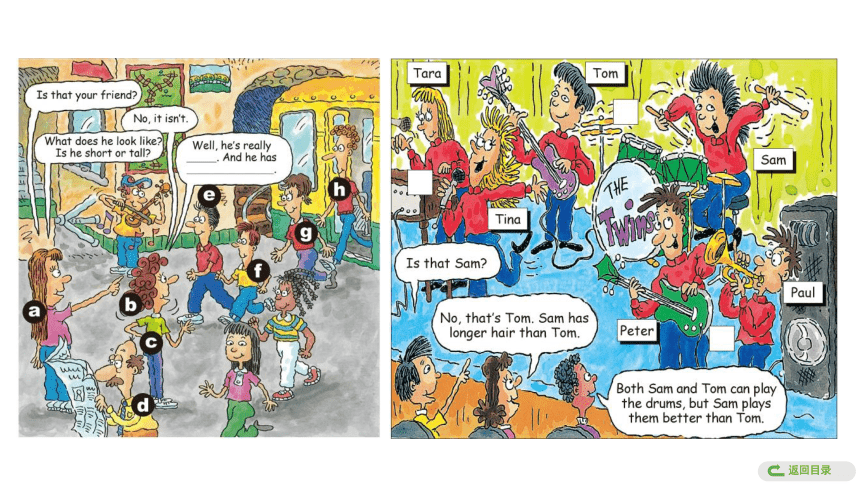
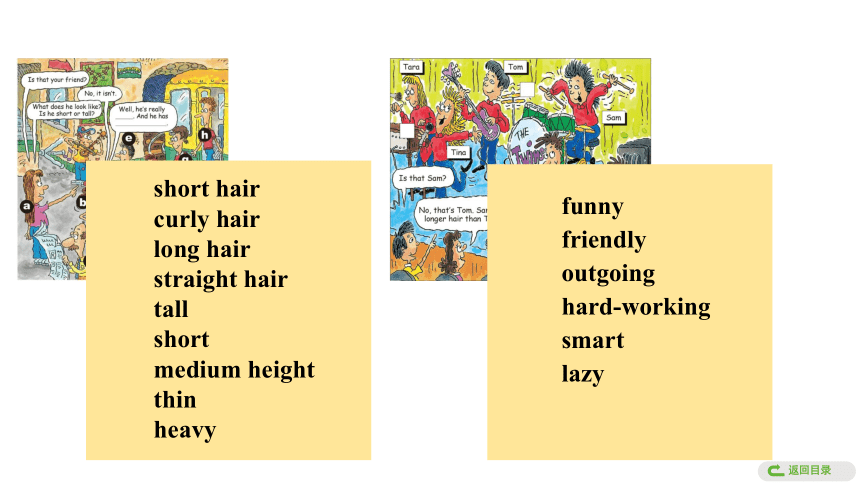
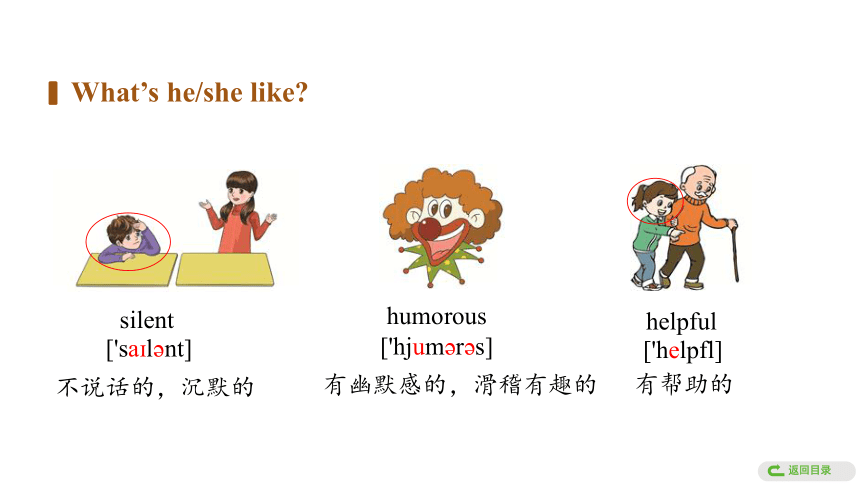

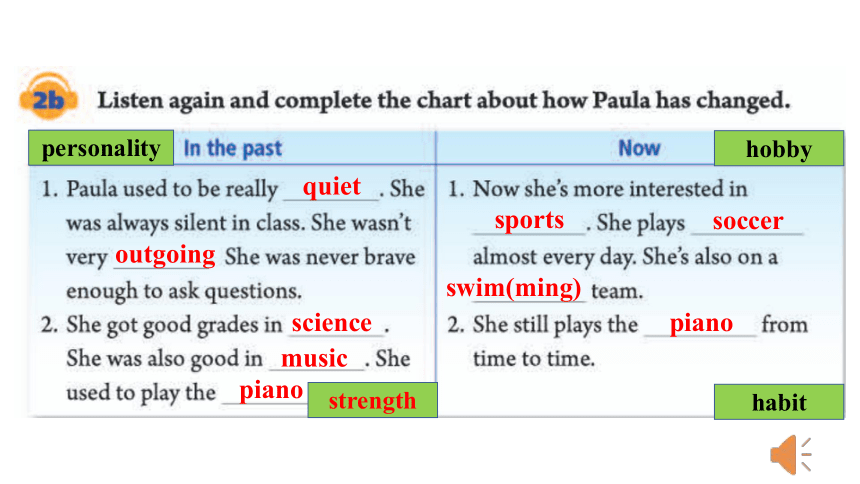
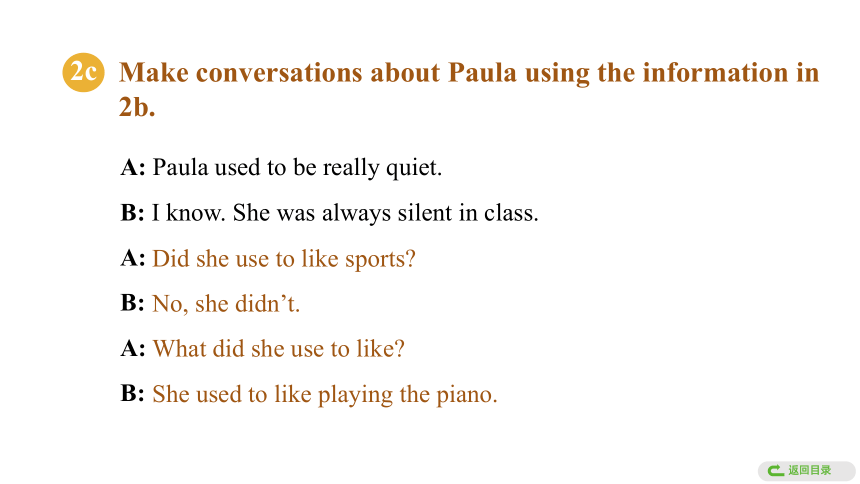
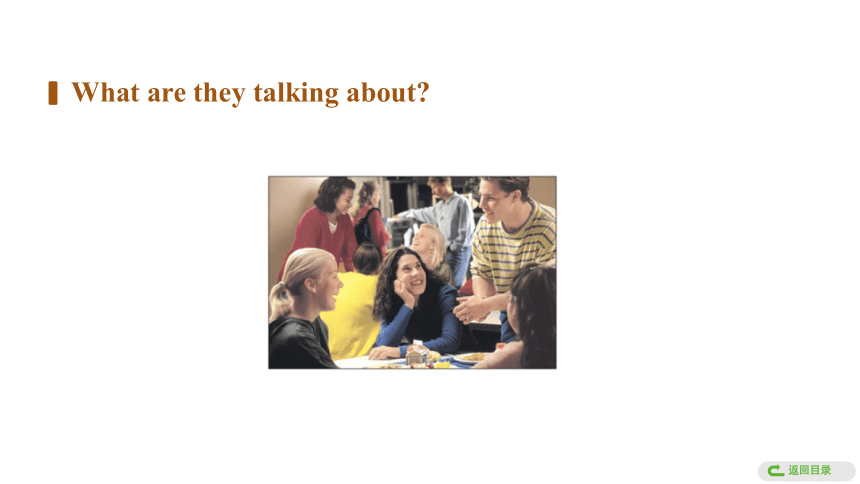
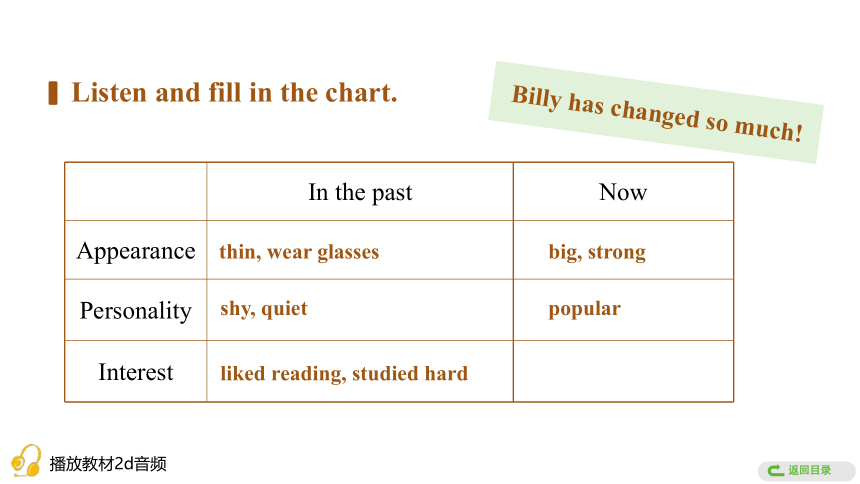
文档简介
(共21张PPT)
Unit 4
I used to be afraid of dark
Section A 2a-2d
funny
friendly
outgoing
hard-working
smart
lazy
short hair
curly hair
long hair
straight hair
tall
short
medium height
thin
heavy
humorous
['hjum r s]
有幽默感的,滑稽有趣的
silent
['sa l nt]
不说话的,沉默的
helpful
['helpfl]
有帮助的
What’s he/she like
2a
Listen and check( ) the words you hear.
friendly
humorous
brave
outing
silent
quiet
serious
active
helpful
humorous
humor
brave
Do these words have somthing in common
They are all adj. words to describe people’s personality.
bravery
quiet
outgoing
science
music
piano
sports
soccer
swim(ming)
piano
personality
strength
hobby
habit
2c
Make conversations about Paula using the information in 2b.
A: Paula used to be really quiet.
B: I know. She was always silent in class.
A:
B:
A:
B:
Did she use to like sports
No, she didn’t.
What did she use to like
She used to like playing the piano.
What are they talking about
In the past Now
Appearance
Personality
Interest
Listen and fill in the chart.
thin, wear glasses
shy, quiet
liked reading, studied hard
big, strong
popular
Billy has changed so much!
播放教材2d音频
Read and underline.
Alfred: This party is such a great idea!
Gina: I agree. It’s been three years since we last saw our primary school classmates.
Alfred: It’s interesting to see how people have changed.
Gina: Billy has changed so much! He used to be so shy and quiet.
Alfred: Yeah, his face always turned red when he talked to girls!
Gina: I used to see him reading in the library every day.
Alfred: That’s because he was a really good student. He studied hard and got good
scores on his exams.
Gina: Did he use to wear glasses
Alfred: Yes, and he used to be thin, too. But look how big and strong he is now!
Gina: He’s so popular now. Look at all the girls around him!
Alfred: This party is such a great idea!
Gina: I agree. It’s been three years since we last saw our primary
school classmates.
Alfred: It’s interesting to see how people have changed.
Gina: Billy has changed so much! He used to be so shy and quiet.
Alfred: Yeah, his face always turned red when he talked to girls!
Gina: I used to see him reading in the library every day.
Alfred: That’s because he was a really good student. He studied hard and got good scores
on his exams.
Gina: Did he use to wear glasses
Alfred: Yes, and he used to be thin, too. But look how big and strong he is now!
Gina: He’s so popular now. Look at all the girls around him!
2d
Role-play the conversation.
播放教材2d音频
Group work
Create a dialogue at the middle school class reunion ten years later, and make use of the vocabulary and sentence patterns you’ve learned.
Language Points
1. Mario, you used to be short, didn't you 马里奥,你过去很矮,不是吗 。
要点精析 1
该句是一个反意疑问句。反意疑问句由两部分组成:前一部分是陈述句,后部分是简短的附加疑问句。陈述句部分若是肯定形式,附加疑问部分就用否定形式;陈述句部分若是否定形式,附加疑问部分就用肯定形式,即“前肯后否,前否后肯”。
例:Mary is verylazy,isn't she 玛丽很懒,不是吗
They were not late for the meeting, were they 他们开会没有迟到,是吗
对反意疑问句的回答,不管问题的提法如何,如果事实是肯定的,就要用yes;如果事实是否定的,就要用no;如果反意疑问的陈述句部分含有否定意义的词(no,never,nothing,few,hardly
little等)附加疑问部分要用肯定形式
例: There is little water in the glass, is there 玻璃杯里几乎没有水,是吗
祈使句的反意疑问句,一般附加疑问部分用will you;而以lets开头的祈使句其附加疑问部分用shall we。
例: Come here earlier next time,will you 下次早点儿来这儿,好吗
Let's have a rest, shall we 让我们休息一下,好吗
方法技巧
反意疑问句的回答
回答反意疑问句,答案含义是依据
肯定事实用yes,否定事实用no
2. It's been three years since we last saw our primary school classmates.
自从上次我们见到我们的小学同学以来已经有三年的时间了
要点精析 1
“It's been+一段时间+since+从句”意为“自从......以来已经有多长时间了”还可
表示为“It is+一段时间+ since+从句”。
例: It has been five years since I began to learn English. =It's five years since I began to learn English.自从我开始学英语已经有5年的时间了
要点精析 2
此句为现在完成时的句子。现在完成时常与 since引导的以某一时间为起点的时间状语或 for引导的一段时间连用,谓语动词要用延续性动词
例:She has lived in Beijing since 1998.她从1998年起就住在北京
We have known each other for five years.我们已经认识彼此5年了。
3. Now she's not shy anymore and loves singing in front of crowds.现在她不再害羞,并且喜欢在观众面前唱歌
要点精析
not...anymore 意为“不再......”,其同义短语有 no more,not...any longer, no longer.
例:He isn't a teacher anymore.他不再是一位老师了
辨析 not...any more 与 not...any longer
not...any more(=no more) 多指数量和程度上“不再”常修饰非延续性动词。常
用于将来时态
not...any longer(=no longer)表示时间上或距离的“不再”,常修饰延续性动词
常用于现在时态
例: He will no more go there.他将不再去那里了
一、 用所给单词的适当形式填空
1. Sally is my best friend. She often sits beside me (silent)
when I am sad.
2. The girl is so shy that her face always (turn) red when she
talks with others.
3. The teacher told us some ways to get good (score) on the
exams.
silently
turns
scores
一
二
三
四
五
六
4. It’s a popular 3D movie, and you may have to wear 3D
(glass) to see it.
5. Our English teacher, Mr. Brown, is (friend) to us. We
all regard him as our friend.
glasses
friendly
一
二
三
四
五
六
一、从方框中选出正确的词并用其适当形式填空
help silent score brave humor
1. I couldn’t help laughing loudly when I heard such a story.
2. You will get good on the exams if you work hard.
3. The girl used to be in class, but now she is active.
4. My brother is a boy.He is never afraid of anything.
5. Mary thinks the book is to her, for she can learn a lot from it.
humorous
scores
silent
brave
helpful
三、 根据汉语提示完成句子,每空一词。
1. 自从我妹妹去中国已经有三年了。
three years since my sister went to China.
2. 苏珊有时让我帮助她做作业。
Susan asks me to help her with her
homework .
3. 她现在比以前高多了。
She is much taller than she .
4. 她过去在音乐课上常常表现得出色。
She well in music class.
It
has
been
from
time
to
time
used
to
be
used
to
do
一
二
三
四
五
Unit 4
I used to be afraid of dark
Section A 2a-2d
funny
friendly
outgoing
hard-working
smart
lazy
short hair
curly hair
long hair
straight hair
tall
short
medium height
thin
heavy
humorous
['hjum r s]
有幽默感的,滑稽有趣的
silent
['sa l nt]
不说话的,沉默的
helpful
['helpfl]
有帮助的
What’s he/she like
2a
Listen and check( ) the words you hear.
friendly
humorous
brave
outing
silent
quiet
serious
active
helpful
humorous
humor
brave
Do these words have somthing in common
They are all adj. words to describe people’s personality.
bravery
quiet
outgoing
science
music
piano
sports
soccer
swim(ming)
piano
personality
strength
hobby
habit
2c
Make conversations about Paula using the information in 2b.
A: Paula used to be really quiet.
B: I know. She was always silent in class.
A:
B:
A:
B:
Did she use to like sports
No, she didn’t.
What did she use to like
She used to like playing the piano.
What are they talking about
In the past Now
Appearance
Personality
Interest
Listen and fill in the chart.
thin, wear glasses
shy, quiet
liked reading, studied hard
big, strong
popular
Billy has changed so much!
播放教材2d音频
Read and underline.
Alfred: This party is such a great idea!
Gina: I agree. It’s been three years since we last saw our primary school classmates.
Alfred: It’s interesting to see how people have changed.
Gina: Billy has changed so much! He used to be so shy and quiet.
Alfred: Yeah, his face always turned red when he talked to girls!
Gina: I used to see him reading in the library every day.
Alfred: That’s because he was a really good student. He studied hard and got good
scores on his exams.
Gina: Did he use to wear glasses
Alfred: Yes, and he used to be thin, too. But look how big and strong he is now!
Gina: He’s so popular now. Look at all the girls around him!
Alfred: This party is such a great idea!
Gina: I agree. It’s been three years since we last saw our primary
school classmates.
Alfred: It’s interesting to see how people have changed.
Gina: Billy has changed so much! He used to be so shy and quiet.
Alfred: Yeah, his face always turned red when he talked to girls!
Gina: I used to see him reading in the library every day.
Alfred: That’s because he was a really good student. He studied hard and got good scores
on his exams.
Gina: Did he use to wear glasses
Alfred: Yes, and he used to be thin, too. But look how big and strong he is now!
Gina: He’s so popular now. Look at all the girls around him!
2d
Role-play the conversation.
播放教材2d音频
Group work
Create a dialogue at the middle school class reunion ten years later, and make use of the vocabulary and sentence patterns you’ve learned.
Language Points
1. Mario, you used to be short, didn't you 马里奥,你过去很矮,不是吗 。
要点精析 1
该句是一个反意疑问句。反意疑问句由两部分组成:前一部分是陈述句,后部分是简短的附加疑问句。陈述句部分若是肯定形式,附加疑问部分就用否定形式;陈述句部分若是否定形式,附加疑问部分就用肯定形式,即“前肯后否,前否后肯”。
例:Mary is verylazy,isn't she 玛丽很懒,不是吗
They were not late for the meeting, were they 他们开会没有迟到,是吗
对反意疑问句的回答,不管问题的提法如何,如果事实是肯定的,就要用yes;如果事实是否定的,就要用no;如果反意疑问的陈述句部分含有否定意义的词(no,never,nothing,few,hardly
little等)附加疑问部分要用肯定形式
例: There is little water in the glass, is there 玻璃杯里几乎没有水,是吗
祈使句的反意疑问句,一般附加疑问部分用will you;而以lets开头的祈使句其附加疑问部分用shall we。
例: Come here earlier next time,will you 下次早点儿来这儿,好吗
Let's have a rest, shall we 让我们休息一下,好吗
方法技巧
反意疑问句的回答
回答反意疑问句,答案含义是依据
肯定事实用yes,否定事实用no
2. It's been three years since we last saw our primary school classmates.
自从上次我们见到我们的小学同学以来已经有三年的时间了
要点精析 1
“It's been+一段时间+since+从句”意为“自从......以来已经有多长时间了”还可
表示为“It is+一段时间+ since+从句”。
例: It has been five years since I began to learn English. =It's five years since I began to learn English.自从我开始学英语已经有5年的时间了
要点精析 2
此句为现在完成时的句子。现在完成时常与 since引导的以某一时间为起点的时间状语或 for引导的一段时间连用,谓语动词要用延续性动词
例:She has lived in Beijing since 1998.她从1998年起就住在北京
We have known each other for five years.我们已经认识彼此5年了。
3. Now she's not shy anymore and loves singing in front of crowds.现在她不再害羞,并且喜欢在观众面前唱歌
要点精析
not...anymore 意为“不再......”,其同义短语有 no more,not...any longer, no longer.
例:He isn't a teacher anymore.他不再是一位老师了
辨析 not...any more 与 not...any longer
not...any more(=no more) 多指数量和程度上“不再”常修饰非延续性动词。常
用于将来时态
not...any longer(=no longer)表示时间上或距离的“不再”,常修饰延续性动词
常用于现在时态
例: He will no more go there.他将不再去那里了
一、 用所给单词的适当形式填空
1. Sally is my best friend. She often sits beside me (silent)
when I am sad.
2. The girl is so shy that her face always (turn) red when she
talks with others.
3. The teacher told us some ways to get good (score) on the
exams.
silently
turns
scores
一
二
三
四
五
六
4. It’s a popular 3D movie, and you may have to wear 3D
(glass) to see it.
5. Our English teacher, Mr. Brown, is (friend) to us. We
all regard him as our friend.
glasses
friendly
一
二
三
四
五
六
一、从方框中选出正确的词并用其适当形式填空
help silent score brave humor
1. I couldn’t help laughing loudly when I heard such a story.
2. You will get good on the exams if you work hard.
3. The girl used to be in class, but now she is active.
4. My brother is a boy.He is never afraid of anything.
5. Mary thinks the book is to her, for she can learn a lot from it.
humorous
scores
silent
brave
helpful
三、 根据汉语提示完成句子,每空一词。
1. 自从我妹妹去中国已经有三年了。
three years since my sister went to China.
2. 苏珊有时让我帮助她做作业。
Susan asks me to help her with her
homework .
3. 她现在比以前高多了。
She is much taller than she .
4. 她过去在音乐课上常常表现得出色。
She well in music class.
It
has
been
from
time
to
time
used
to
be
used
to
do
一
二
三
四
五
同课章节目录
- Unit 1 How can we become good learners.
- Section A
- Section B
- Unit 2 I think that mooncakes are delicious!
- Section A
- Section B
- Unit 3 Could you please tell me where the restroom
- Section A
- Section B
- Unit 4 I used to be afraid of the dark.
- Section A
- Section B
- Unit 5 What are the shirts made of?
- Section A
- Section B
- Review of Units 1-5
- Unit 6 When was it invented?
- Section A
- Section B
- Unit 7 Teenagers should be allowed to choose their
- Section A
- Section B
- Unit 8 It must belong to Carla.
- Section A
- Section B
- Unit 9 I like music that I can dance to.
- Section A
- Section B
- Unit 10 You're supposed to shake hands.
- Section A
- Section B
- Review of Units 6-10
- Unit 11 Sad movies make me cry.
- Section A
- Section B
- Unit 12 Life is full of the unexpected
- Section A
- Section B
- Unit 13 We're trying to save the earth!
- Section A
- Section B
- Unit 14 I remember meeting all of you in Grade 7.
- Section A
- Section B
- Review of Units 11-14
